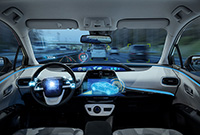
Researcher: Myounghoon “Philart” Jeon, PI
Sponsor: KATRI (Korea Automotive Testing & Research Institute)
Amount of Support: $450,703
Duration of Support: 4 years
Abstract: The goal of the project is to design and evaluate intelligent auditory interactions for improving safety and user experience in the automated vehicles. To this end, we have phased plans for four years. In year 1, we prepare for the driving simulator for the automated driving model. In year 2, we estimate and model driver states in automated vehicles using multiple sensing approaches. In year 3, we design and evaluate discrete auditory alerts for safety purpose, with a focus, specifically, on take-over scenarios. In year 4, we develop real-time sonification systems for overall user experience and make guidelines.
Intellectual Merits: The proposed work will significantly advance theory and practice in the design of natural and intuitive communication between a driver (or occupant) and an automated/autonomous vehicle. The results of the proposed research will not only contribute to design of the current vehicles, but also guide directions of social interaction in the automated vehicles in the near future. We will additionally obtain a theoretical framework to estimate and predict driver state and driving behavior. A more comprehensive understanding of the relationship between multiple sensing (e.g., neurophysiological and behavioral) data and driver states will ultimately be used to construct a more generic driving behavior model capable of combining affective elements and cognitive elements to positively influence safer driving. The proposed work will specifically contribute to the body of current literature in using auditory user interfaces for the automated vehicle contexts. Subsequently, this work will significantly advance theory and practice in interactive sonification design, affective computing, and driving psychology.
Broader Impacts: Applying novel in-vehicle auditory interactions to facilitate take-over process and eco-driving, and to mitigate distractions has the high potential to significantly decrease driving accidents and carbon footprints. Moreover, the entire program of the proposed research can be further developed for other vehicle situations. The proposed work offers an exciting simulated driving platform to integrate research with multidisciplinary STEM (Science, Technology, Engineering & Math) education. The principal investigator of the project will train graduate students, who will mentor undergraduates in the Mind Music Machine Lab at Michigan Tech. Driving simulators will be used for diverse hands-on curricula and courses. The PI will design driving simulation activities to teach courses as part of Michigan Tech’s Summer Youth Programs (SYP). Michigan Tech’s SYP has a strong longitudinal history of recruiting women, rural students from the Upper Peninsula of Michigan, and inner city minority students from the Detroit and Grand Rapids area. They also have a decade of assessment data that demonstrate SYP alumni are more likely to pursue STEM college degrees. The PI will also try to develop close partnerships and collaborations with other universities of the consortium and KATRI in Korea. Students and researchers can come to Michigan Tech and conduct and experience research projects together using cutting edge technologies. Research and education outcomes will be disseminated by the team, through the planned workshop on “New opportunities for in-vehicle auditory interactions in highly automated vehicles” at the International Conference on Auditory Display and AutomotiveUI Conference.